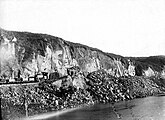Waihi-Waikino Gold Tramway

The Waihi-Waikino Gold Tramway (also known locally as The Rake) was a narrow-gauge railway which ran between gold mines at Waihi and the Victoria Battery at Waikino. Owned by the Waihi Gold Mining Company, it operated from 1897 to 1952.[1] It was the only private railway in New Zealand used by the gold industry.[2]
History[edit]

The township of Waihi was home to the Martha Gold Mine, with the first stamping battery coming into use in 1882. By the mid 1890s the mine was needing a new stamping battery, which was decided to be put down the Ohinemuri River at Waikino due to the availability of water power, and to keep stamping noise away from Waihi township. The tramway was built parallel to the Ohinemuri River, 5.75 miles (9.25 km) long, to the uncommon gauge of 2 ft 9 in (838 mm). Maximum gradient was 1 in 40 (25‰), with the rails being 40 lb/yard (20 kg/m).[3] The tramway started with only one locomotive, named "Ohinemuri", but more were purchased later, ending up with 5 from Manning Wardle, except for the last which was from W. G. Bagnall,[4] as the former company had ceased operating by 1934 when it was purchased. The year 1905 saw the NZ Government Railway open to Waihi, and an overpass was built east of Waihi station to allow the NZR line to pass over the Rake Line. The structure is still there today. By 1952 increasing costs lead to the closure of the Martha Mine (the mine later re-opened in 1987 as open cast). The tramway took around two years to be lifted,[4] with no locos or rolling stock being preserved.
Rolling stock[edit]
Locomotives[edit]
| Wheels | Manufacturer | Number | Photo | Year | Name | Cylinder Bore x Stroke in Inches |
|---|---|---|---|---|---|---|
| 0-4-0 / 0-4-2 | Manning Wardle | 1329 |  |
1896 | Ohinemuri | 9 x 14 |
| 0-4-2 | Manning Wardle | 1424 |  |
1898 | Victoria | 9 x 14 |
| 0-4-2 | Manning Wardle | 1497 |  |
1900 | Albert | ? |
| 4-4-0 | Manning Wardle | 1662 |  |
1905 | Waikino | 10 x 16 |
| 4-4-2 | Manning Wardle | 1753 |  |
1909 | Dominion | 10 x 16 |
| 2-4-2 | W. G. Bagnall | 2513 |  |
1934 | Empire | 10 x 16 |
Wagons[edit]
Small 4-wheel V-tip trucks were used for the transport of quartz. Some small goods and flat wagons were used, the latter occasionally for the exceptional transport of passengers, as the railway has never been a common carrier.[2]
-
"Ohinemuri" and rake of full trucks at No.1 Shaft Hoppers, 1900
-
Rohaus cutting on railroad to Waikino. "Ohinemuri" travelling toward Waikino, ca. 1897
-
"Ohinemuri" in the second largest cutting 1½ miles from Waikino
-
NZR FA class loco crossing Waihi Gold Co rake line on the Mangatoetoe Bridge, Mount Karangahake in background
-
Tramway enters at bottom right. Left-hand branch to the stone breakers left of map. Right-hand branches to NZR (grey), coal hoppers, engine sheds. Turntable where tramway and incline to kilns meet.
Nearby railways[edit]
The Victoria Battery Tramway now runs a 1.2 kilometres (0.75 mi) long 2 ft (610 mm) gauge railway on the former battery site at Waikino.[5]
The Goldfields Railway is a 3 ft 6 in (1,067 mm) gauge heritage railway between Waihi and Waikino on a section of track that was part of the East Coast Main Trunk Railway until the Kaimai Tunnel deviation made it redundant in 1978.[6]
References[edit]
- ^ "Time Line - Tramway to Victoria Battery - The Rake". Ohinemuri. Retrieved 30 July 2018.
- ^ a b R.D. Grant, E.W. Robson and W.W. Stewart: "Waihi Gold Mining Company." The New Zealand Railway Observer, Volume Four (June 1947), page 81. Retrieved 1 August 2018.
- ^ "HP Barry, description of tramway". Ohinemuri -. Retrieved 1 August 2018.
- ^ a b "Historical Summary - Tramway to Victoria Battery - The Rake". Ohinemuri. Retrieved 1 August 2018.
- ^ "Attractions". The Victoria Battery Tramway and Museum Society Inc. Retrieved 1 August 2018.
- ^ Goldfields Railway - About Us





